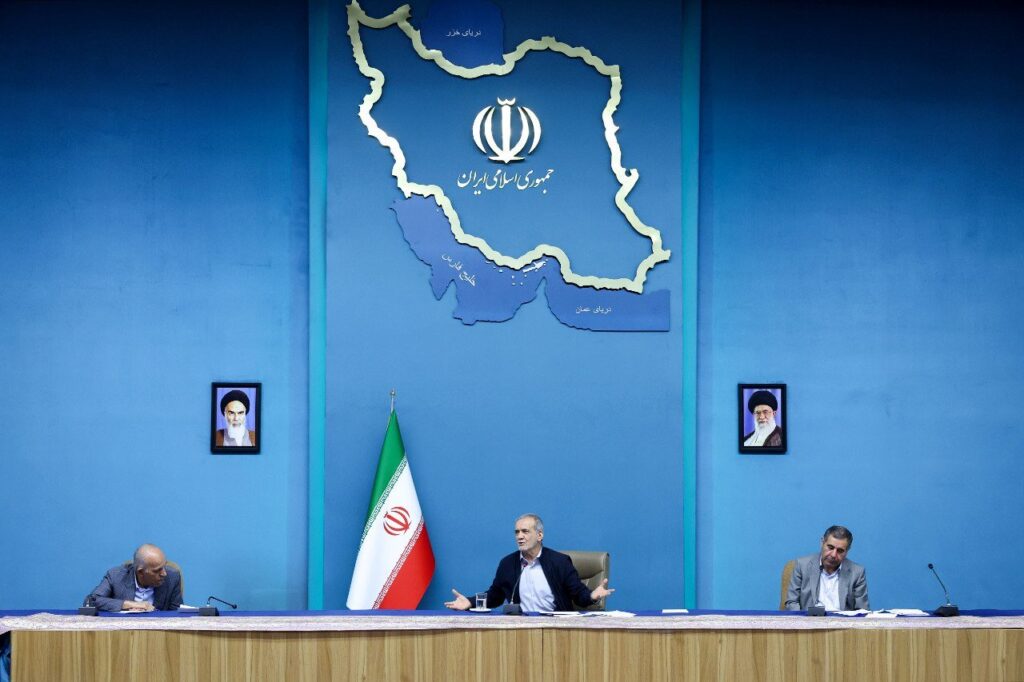TEHRAN – Iranian President Masuud Pezeshkian has issued a harsh reminder as he calls for fresh nuclear negotiations to echo in the western capital. Diplomacy is not equivalent to surrender, and trust cannot be restored through intimidation.
“We believe in negotiations,” he firmly stated. “But it’s not at any price. We don’t want war… or nuclear weapons. We want dialogue. But Americans have to prove that they want it.”
The message delivered at a Sunday evening gathering with political and grassroots leaders went beyond rhetoric. It captured the essence of Iran’s position in the face of relentless US pressure and attitude.
“How can we apply maximum pressure and negotiate with a country that threatens us on a daily basis?” asked Pezeschkian, pointing to Washington’s track record of broken commitments and economic warfare. “We talked to the world, we talked to our neighbors, we improved those relationships. But the US is another story.”
At the heart of Pezeschkian’s comments is the deep frustration felt by the Iranian leader. Even if Tehran has flexibility, restraint and willingness to engage, it faces ongoing sanctions, pressures and threats.
Pezeshkian reiterated his principled position in Iran, saying, “We will interact with the world with respect and do not seek conflict. But we will not tolerate humiliation. We do not seek bombs. We have repeatedly told them.
In the mid-1990s, Ayatollah Alikhamenei issued a fatwa banning the production, stockpiling and use of weapons of mass destruction, including nuclear weapons.
Compliance records encountered betrayal
Iran’s suspicions about the United States stem from its historical experience. Following the signing of the 2015 Joint Comprehensive Action Plan (JCPOA), Iran has fully adhered to its commitments. This was verified through 15 regular reports from the International Atomic Energy Agency (IAEA). This has repeatedly confirmed that Iran meets the terms of the transaction.
Nevertheless, in May 2018, the United States unilaterally withdrew from the JCPOA under President Donald Trump and reintroduced a drastic sanctions regime. The lawsuit not only violated international norms, but also opposed UN Security Council resolution 2231 and approved the agreement.
European signatories undoubtedly voiced France, Germany and the UK, but voiced regrets, but ultimately failed to protect Iran from the outcome of Washington’s withdrawal.
In response to Articles 26 and 36 of the JCPOA, Iran gradually reduced its obligations in a transparent and reversible way. Tehran consistently argued that if sanctions were removed and solid assurances were given for future violations, full compliance could be recommended.
Despite repeated setbacks, Iran has kept its diplomatic channels open. High-level discussions with Geneva E3 and Beijing’s China demonstrate Tehran’s continued dedication to diplomatic efforts. Iranian officials have reiterated that they are ready to reach a reliable, lasting agreement. This will completely lift sanctions and verifiable safeguards, particularly for future non-compliance by Washington.
However, the United States continues to undermine trust with its provocative rhetoric. In addition to the constant threat, the US continues to issue new sanctions against Iran. Recently, on April 1, the U.S. Treasury Department said in a statement last Tuesday that its Foreign Assets Control Office (OFAC) had worked with the Justice Department to take action against six individuals based in Iran, the United Arab Emirates (UAE) and China.
Iran’s skepticism about the United States is not limited to the JCPOA. From the CIA push-coup dengue in 1953 to the koup dengue against Prime Minister Mohammad Mosadegu to the collapse of Iranian Airlines 655 in 1988, Tehran’s unrest comes from decades of historic responsiveness.
Even outside of Iran, the history of abandoning Washington’s important international agreements is shortly after his second appointment, like the Paris Climate Agreement decided by Trump on January 20, 2025.
In contrast, Iran has consistently demonstrated its willingness to engage in dialogue. Involvement in the global framework, continued collaboration with the IAEA, and constructive regional diplomacy indicate that Tehran is open to dialogue.
Pezeshkian’s message is clear. Iran is willing to argue, but will not surrender. The Islamic Republic rejects any agreement that does not include protection or permits future betrayal. If Washington truly values diplomacy, trust must be restored through tangible and verifiable measures, rather than creating a threat.
Until then, Iran has argued that the door to diplomacy remains open, but it cannot be a single person or walked it under compulsion.

